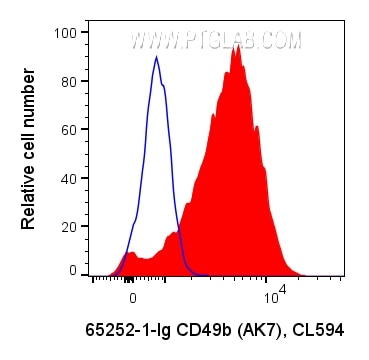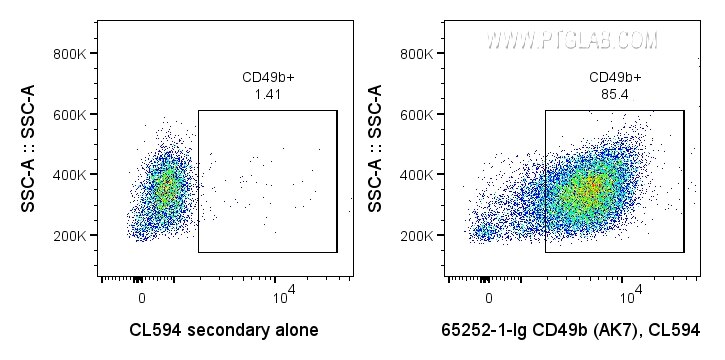Validation Data Gallery
Tested Applications
| Positive FC detected in | human PBMCs |
Recommended dilution
| Application | Dilution |
|---|---|
| This reagent has been tested for flow cytometric analysis. It is recommended that this reagent should be titrated in each testing system to obtain optimal results. | |
| Sample-dependent, Check data in validation data gallery. | |
Product Information
65252-1-Ig targets CD49b in FC, ELISA applications and shows reactivity with Human samples.
| Tested Reactivity | Human |
| Host / Isotype | Mouse / IgG1, kappa |
| Class | Monoclonal |
| Type | Antibody |
| Immunogen | Human platelets 相同性解析による交差性が予測される生物種 |
| Full Name | integrin, alpha 2 (CD49B, alpha 2 subunit of VLA-2 receptor) |
| Calculated molecular weight | 126 kDa |
| GenBank accession number | NM_002203 |
| Gene Symbol | Integrin alpha 2 |
| Gene ID (NCBI) | 3673 |
| RRID | AB_3670283 |
| Conjugate | Unconjugated |
| Form | Liquid |
| Purification Method | Affinity purification |
| Storage Buffer | PBS with 0.09% sodium azide |
| Storage Conditions | Store at 2-8°C. Stable for one year after shipment. |
Background Information
CD49b, also known as alpha2 integrin, is a type I transmembrane glycoprotein which forms an adhesion molecule VLA-2 with beta1 integrin. CD49b is a receptor for many (extracellular) matrix and non-matrix molecules (PMID: 23847623). CD49b is expressed on numerous cell types including platelets, activated T cells, B cells, and monocytes. CD49b activation skews NK cell effector function to a phenotype that exhibits elevated IFN-γ production with a concomitant inhibition of motility and cytolytic function (PMID: 32971468, 32762681). The Anti-Human CD49b antibody, clone AK7, is derived from Human platelets.
Protocols
| Product Specific Protocols | |
|---|---|
| FC protocol for CD49b antibody 65252-1-Ig | Download protocol |
| Standard Protocols | |
|---|---|
| Click here to view our Standard Protocols |

